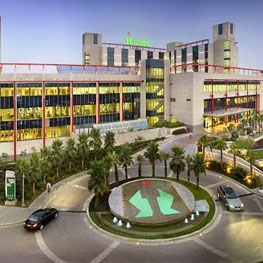About the Doctor
Dr. Naval Mendiratta has started as Senior Consultant in Fortis Vasant Kunj for 1.5 years. Was then placed in Singapore for fellowship program. Earlier, he was working as a Consultant in Medanta the Medcity in the department of Rheumatology and Clinical Immunology for last 5 years.
Specialization
- Vasculitis
- Systemic Lupus Erythrematous
- Spondyloarthopathy
Awards
Frequently Asked Questions About Rheumatology
Who is a Rheumatologist?
A Rheumatologist is a specialist who deals with the diagnosis and treatment of patients with joint and musculoskeletal problems. He/she first has to specialise as a physician and then receives additional training and experience in the diagnosis and treatment of arthritis and related musculoskeletal conditions.
How do you know whether you have arthritis?
Patients with Arthritis may experience the following symptoms: pain and swelling of one or more joints, feel stiffness in the joints – more in the morning, redness and warmth of the affected joints and these symptoms van be recurrent or persistent.
What are the common Rheumatological conditions in general population?
Rheumatological conditions can be considered under two main headings- inflammatory or non-inflammatory.
The inflammatory conditions include: Rheumatoid Arthritis; SLE (Systemic Lupus Erythematosus); Gout and other crystal deposition diseases; Connective tissue diseases (Scleroderma, Wegener’s, Churg-strauss, Polyarteritis nodosa, MCTD, Polymyositis, Dermatomyositis, Polymyalgia Rheumatica, Giant cell arteritis); Ankylosing Spondylitis; Psoriatic Arthritis; Reactive Arthritis; Juvenile (Paediatric) Idiopathic Arthritis.
The non-inflammatory conditions include: Osteoarthritis; Osteoporosis; Osteomalacia; Rickets; low back pain; Fibromyalgia; Tendonitis and bursitis.
What causes rheumatic diseases?
Rheumatic diseases are generally believed to be caused by a combination of genetic and environmental factors. In other words, you may be born with a susceptibility to a disease, but it may take something in your environment to get the disease started. Some of these factors have been identified. For example, in osteoarthritis, inherited cartilage weakness or excessive stress on the joint from repeated injury may play a role. In rheumatoid arthritis, juvenile idiopathic arthritis, and lupus, patients may have a variation in a gene that codes for an enzyme called protein tyrosine phosphatase nonreceptor 22 (PTPN22). Certain viruses may trigger disease in genetically susceptible people. For example, scientists have found a connection between Epstein-Barr virus and lupus. There are likely many genes and combinations of genes that predispose people to rheumatic diseases, and many different environmental factors that trigger them.
Gender is another factor in some rheumatic diseases. Lupus, rheumatoid arthritis, scleroderma, and fibromyalgia are more common among women. This indicates that hormones or other male-female differences may play a role in the development of these ¬conditions.
Will exercise help my joints?
Exercise is important to maintain the flexibility, range of movement at the joint and to strengthen the muscles. However, exercise will not reduce joint inflammation and usually should be started, only after effective control of inflammation with proper therapy.
What is the difference between a Rheumatologist and an Orthopedic Surgeon?
Rheumatologists are Physicians and Orthopaedic surgeons are surgeons; therefore all medically related joint disorders are dealt by a Rheumatologist. When the joints are badly damaged or when there are fractures, then you need to consult an orthopedic surgeon











